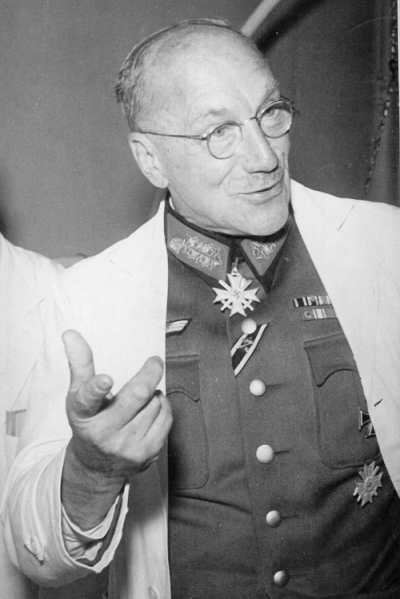Sauerbruch, Ferdinand-Ernst
- Date of birth:
- July 3rd, 1875 (Barmen/Rhineprovince, Germany)
- Date of death:
- July 2nd, 1951 (Berlin/Brandenburg, Germany)
- Nationality:
- German
Biography
Ferdinand Sauerbruch was an accomplished German surgeon, who worked for the Berlin Charité academic hospital from 1927 and during the Second World War. Because of his achievements in the field of medicine he was one of the leading practitioners of the early twentieth century.
Upon completing medical school in 1902 he worked as a doctor in the surgical departments of several hospitals in Germany and in Zürich, Switzerland. From 1908 onwards he supervised the surgical polyclinic in Marburg as a professor, after which he was made director of the university hospital in Zürich. In 1914 he voluntarily enlisted for the German army and was appointed consulting surgeon in the 15 Army Corps. From 1915 onwards he worked at the surgical hospital in Greifswald and supervised a military hospital where many amputations were performed. After the war he started at the university clinic in München, and then supervised the Charité surgical university clinic from 1927.
During his medical-scientific career Sauerbruch developed ground-breaking techniques for performing ribcage and stomach operations, and the surgical treatment of pulmonary tuberculosis. He also developed a prosthetic hand for those injured in the war, the ‘Sauerbruch hand’, which allowed the patient to open and close the fingers at will. In 1931 he performed the first successful operation to treat a brain aneurysm.
As a highly esteemed doctor, Sauerbruch treated, among others, Joseph Goebbels and Paul von Hindenburg. He became personally acquainted with Hitler in 1920, but he never joined the NSDAP. During the Nazi regime he received much praise. He received the first Nationalpreis für Kunst und Wissenshaft (National Art and Science Award), the Nazi equivalent of the Nobel Prize, during the Reich party convention in 1937. As Generalartz he received the Ritterkreutz des Kriegsverdienstkreuzes mit Schwertern (Knight’s Cross of the War Merit Cross with Swords) in October 1943.
Sauerbruch’s role at the time of the Nazi regime is contested. As director of the Deutschen Forschungsgemeinshaft (German Research Foundation) he agreed to finance medical experiments on human test subjects in the concentration camps. He was not an anti-Semite, however, and was connected to those involved in Hitler’s assassination attempt on June 20 1944, and knew of their plans. His son Peter was later arrested as a known associate of assassin Claus von Stauffenberg.
After the war he was a member of the medical department of the military health department in Soviet-occupied Berlin from 1946 to 1949. He continued to operate until his death, although his dementia rendered him virtually incapable of doing so. He died in Berlin on June 2nd 1951.
Do you have more information about this person? Inform us!
- Period:
- Second World War (1939-1945)
- Rank:
- Generalarzt der Reserve
- Awarded on:
- October 11th, 1943
- Period:
- Second World War (1939-1945)
- Period:
- Second World War (1939-1945)
Sources
- Photo 1: de.wikipedia.org (Public Domain)
- - KLEE, E., Das Personenlexikon zum Dritten Reich, Fischer, Frankfurt am Main, 2007.
- Axis History Biographical Research via Axis History Forum
- Spiegel Online
- Deutsche Biographie
- Translation: Nadia Guntlisbergen






